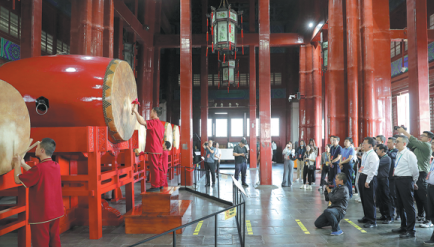Experts call for more industry integration

Delegates at a parallel forum of the 2023 Beijing Culture Forum, which took place on Sept 15, overwhelmingly agreed that the cultural and tourism industries must inevitably move toward deeper integration — necessitated by changes in consumer demand, technological advancements and innovation in business models.
Dai Bin, head of the China Tourism Academy, said those changes have always been the logical basis for the integration and development of culture, cultural industries and tourism. Whether it is the construction of world-class tourist destinations or the development of contemporary urban tourism, tourists should be able to see the evolution of history and the inheritance of culture, and more importantly, see the future of economic and social development.
Dai suggested that the future development of culture and tourism should focus more on small and micro-sized enterprises, entrepreneurial innovation teams, freelancers and flexible workforce. They are young and professional, full of passion for the future and highly sensitive to new demands. And they will definitely produce leading products in niche tracks and segmented fields.
Roundtable dialogues on topics such as cultural creative product and the emergence of new arts formats were also held. Business insiders signed agreements for six key cultural and tourism cooperation projects on-site.
Since the beginning of this year, China's cultural tourism market has seen an accelerated recovery, with new supply represented by immersive tourism becoming increasingly popular among travelers.
Data released by review website Dianping show that since August, the number of reviews containing the keyword "immersive" on the platform has increased by nearly 70 percent year-on-year, making "immersive" a popular keyword searched by consumers in cities such as Shanghai, Wuhan, Beijing, Chengdu and Hangzhou.
Vice-Minister of Culture and Tourism Du Jiang and Vice-Mayor of Beijing Sima Hong presented the launch ceremony of the first batch of 24 national-level immersive experience pilot projects. The Liangma River International Waterfront Area immersive tourism space in Chaoyang district of Beijing and the teamLab Massless Beijing immersive art space in Chaoyang Joy City were on the list.
Most of the other pilot projects are based on the tourist attractions, resorts, leisure blocks, industrial heritage, museums and other venues or related spaces.
By using digital technology and integrating creative culture and other elements, they create new tourism products and consumer scenes through the integration of culture and tourism and a combination of the virtual and the real, allowing tourists to deeply engage and interact.
liyou@chinadaily.com.cn



















